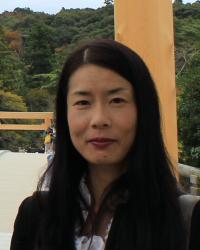
Contact Information
Biography
Michiko Urita is a doctoral candidate in ethnomusicology at the University of Washington. Her dissertation focuses on the Shinto (Japanese indigenous religion) ritual music of gagaku called mikagura no gi and the secret song performed at the Imperial Palace Shrine and Ise Grand Shrine in Japan. She explores this ritual in the contexts of ethnomusicology, religious studies, and traditional performing arts, based on the primary sources and rare ethnographic data that she collected during the sixty-second rite of reconstruction at Ise Grand Shrine in 2013. Besides Shinto ritual music, in a previous project, Michiko has researched North Indian classical music, in particular the ancient vocal genre called dhrupad. She is honored to have received six FLAS (Foreign Language and Area Studies) fellowships from the UW South Asian Center, Fritz and Boeing Graduate Fellowship for International Research and Study, and Presidential Dissertation Fellowship. Her topical interests include sacred sound and irenic scholarship. Michiko organized a series of gagaku events as a project director at the UW and other venues in Seattle in early May 2015. http://www.jaclab.org/project-archives/
Research
Selected Research
- “Shinto.” In SAGE Encyclopedia of Music and Culture.
- “Transreligious and Intercommunal: Hindustani Music in Classical and Contemporary North India.” In Common Knowledge, 22 (2).
- "Kagura Hikyoku: Comparing the Mikagura Rites Held at the Ise Grand Shrine and at the Imperial Sanctuary." In Nihon Kayō Kenkyū [Studies on Japanese Ballads and Songs], 55, 63-73. http://ci.nii.ac.jp/naid/40020822058
- 2015. “Punitive Scholarship: Postwar Interpretations of Shinto and Ise Jingū.” In Common Knowledge, 21(3), 484-509. Duke University Press. http://commonknowledge.dukejournals.org/content/21/3/484.abstract
Courses Taught
MUSIC 316 Music Cultures of the World
MUSIC 317 Music Cultures of the World
JAPAN 134 First Year Intensive Japanese
JAPAN 111, 112, 113 First Year Japanese
JAPAN 234 Second Year Intensive Japanese
JAPAN 211, 212, 213 Second Year Japanese
JAPAN 311, 312, 313 Third Year Japanese